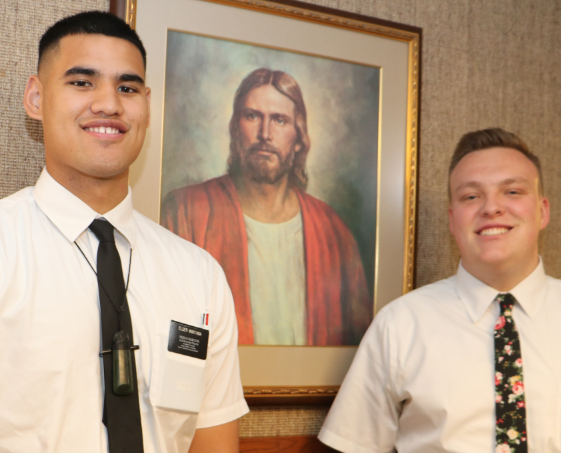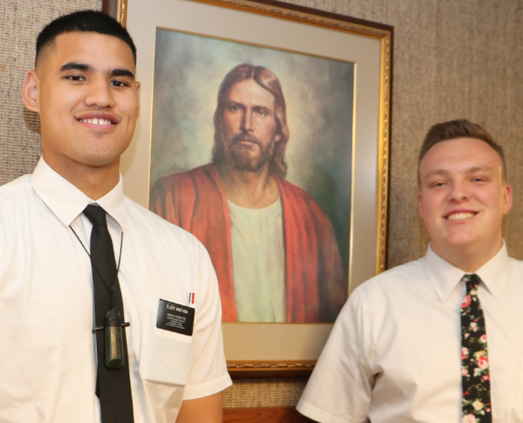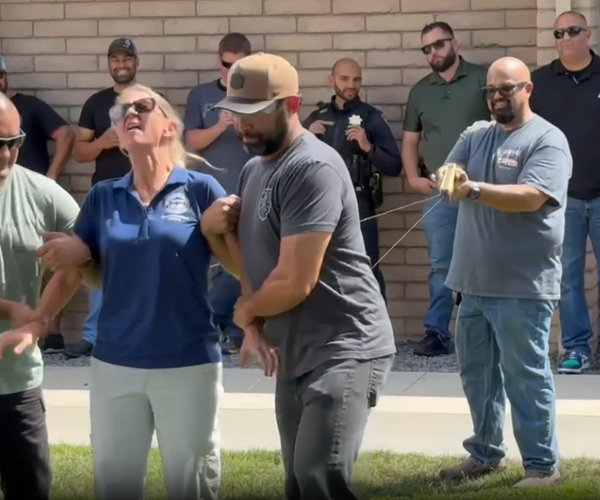Trevin Reagan wants to be a dentist.
And like any 19 year-old, he likes to have fun with friends.
But he’s taking 18 months to do something more important.
It’s about his future.
It’s about connecting with people.
And it’s about inviting others to come onto Jesus Christ.
Reagan left his family behind in Dallas, Texas and put his plans to pursue a college degree and another four years of dental school on hold to serve as a Church of Jesus Chrisi of Latter-day Saints missionary.
Reagan — who has served as a missionary in Carmichael East in Sacramento County, South Sacramento and Stockton before being assigned the Manteca Stake that encompasses Manteca, Ripon, Lathrop, and Tracy — is teamed with Panoa Winitana
Winitana, 19, is a native New Zealander who moved to Spanish Fork, Utah several years ago.
Like other LDS missionaries, not only do they not receive any money for their work but they also help finance their missions themselves and sometimes with a little assistance from family.
Reagan noted younger people he has interacted with on his mission are interested in exploring faith in a bid to find meaning and purpose.
Those who are older, more often focus on what’s next.
Reagan said helping others find answers they are seeking is worth putting dental school on hold.
And that means opening a door for complete strangers who may open the door for him.
Reagan shared an encounter with one woman in a Carmichael apartment complex.
He and his mission partner had been there several times before and were fairly well known to the residents.
The woman in question previously made it clear she had no interest in hearing what Regan had to say.
On a return trip to the complex, Reagan noticed the woman. She was frustrated as she struggled to repair her bicycle.
“Being that missionaries know a little bit about bicycles we offered to get our tools and help her,” Reagan said.
They did just that.
And as they fixed her bicycle, the woman opened the proverbial door asking for the missionaries to share their faith.
Winitana said that reflects what missionaries are trained to do.
While helping someone down the path to commitment and baptism is the ultimate bottom line behind missionaries of all faiths, it is not the driving force with LDS missionaries.
That requires not taking negative reactions people may have to them in a personal manner.
While the pandemic sharpened the church’s use of social media to reach out to those making inquiries as well as missionaries being referred to those that have expressed an interest in learning more, the traditional door-to-door canvas is still part of the missionary’s routine.
That means they get their share of unpleasant responses after barely introducing their selves or even get doors slammed in their face.
Both chalk that up to catching people at a bad time when they’re angry or struggling with something,
And when people do invite them in, it doesn’t trigger what might best be described as a robotic pitch.
That is not who they are.
“I just want to be warm, genuine and be a real person,” Winitana said.
In doing so, it opens up conversation.
And if the conversation ends up going nowhere beyond someone having a pleasant interaction with other human beings, that’s fine.
“It’s about planting seeds,” Winitana said.
Winitana shares a quote by Elder Dalin H. Oaks of the Quorum of the Twelve Apostles: “We do not preach and teach in order to ‘bring people into the Church’ or to increase the membership of the Church. We do not preach and teach just to persuade people to live better lives. We honor and appreciate the many ministers and others who are involved in the kind of ministry that makes bad men good and good men better. That is important, but we offer something more. One can qualify for the terrestrial kingdom instead of the telestial kingdom without the aid of this Church. We are concerned with a higher destination.”
Reagan noted a big misconception he has come across while serving as a missionary is the assumption some have that the Church of Jesus Christ of Latter-day Saints doesn’t use the New Testament.
Reagan and Winitana — along with the other 62,000 LDS missionaries serving at any given time around the world — study the New Testament and Book of Mormon intensely each day after waking up.
The church views the Book of Mormon as another witness. As such, the Bible and the Book of Mormon support each other.
Both noted that besides helping them grow in their faith, serving on a mission has helped them develop the so-called “soft skills.”
That covers time management, grasping the concept of punctuality, setting and committing to goals, how to talk with people who are often complete strangers, the importance of follow through, and how to take a positive approach to new challenges among others.
“It’s life changing,” Reagan said.
To contact Dennis Wyatt, email dwyatt@mantecabulletin.com






